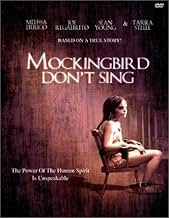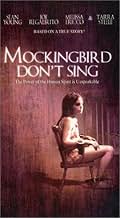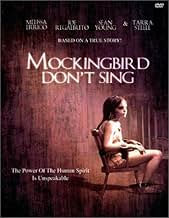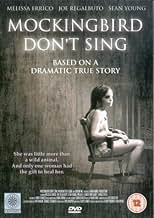NOTE IMDb
6,3/10
2,4 k
MA NOTE
Ajouter une intrigue dans votre langueBased on the actual events of one of the most horrific cases of child abuse ever to be documented, this haunting drama tells the tale of a young girl who was locked in a room for over 12 yea... Tout lireBased on the actual events of one of the most horrific cases of child abuse ever to be documented, this haunting drama tells the tale of a young girl who was locked in a room for over 12 years.Based on the actual events of one of the most horrific cases of child abuse ever to be documented, this haunting drama tells the tale of a young girl who was locked in a room for over 12 years.
- Réalisation
- Scénario
- Casting principal
- Récompenses
- 1 victoire au total
Avis à la une
I missed this film, when it was displayed at University by my' Psychology department, but as soon as I stumbled over it in our local Video Store, I rented it and quite honestly, I don't know what to tell you. I really believe, that I can't say this was a good film, because the story is just too sad and too real. What I can say though, is that this is an utmost interesting film, which displays what humans are capable of in a very professional way. I must say this, for I felt this was not so much a dramatized version of a true life event, but rather a documentary on a true life event. This is neither a tear jerker, nor a graphically violent film but maybe that it is also the reason it is twice as memorable as your average psychological drama. This film will leave you sitting shocked and numb in front of your TV.
8 out of 10 (for people who are really interested in the human psyche like psychology students)
7 out of 10 (for the average viewer)
8 out of 10 (for people who are really interested in the human psyche like psychology students)
7 out of 10 (for the average viewer)
The movie was set in the 70s and it accurately depicted the life and times through the clothes, hairdo, household products and music. The central character is the 13 year old victim of child abuse, Katie Standen and the women who sought to bring out of her abused state, namely her mother Mrs. Standen, child therapist Judy Bingham and psychology graduate student Sandra. The story is told from the point of view of Sandra. One can't help but feel a sense of melodrama and a tinge of sadness when seeing how all 3 desperately try to save Katie whilst fighting each other for her custody and trust. Katie, played by Tara Steele is excellent in her role as a victim who spits, vomits and then eats again her food and also, "touches" herself. The ending leaves you somewhat sad and melancholic and will stay in your head for days.
This movie kept me glued to the screen. I think it is because of natural human instinct to be inquisitive about terrible & traumatic events that happen to others. Also, the acting was really believable and natural. The storyline was great, except for the ending. At the end of the movie, they had text on the screen telling what happened to each character. But they didn't tell enough of what happened to Katie. I don't like to be left hanging about the main character. It is like missing the end of the movie--what is the point of watching 90% of a movie, if you miss the last 10%? I really wanted to know the outcome, and still do. Maybe if I search online, I can find out some more information. It was definitely worth watching. But, I would have given it a score of 9 instead of 7 if it had more info about the main character and her ending.
8/9/03
Dear Sylvia Marciniak
Thank you for looking at our film "Mockingbird Don't Sing". I am the producer director.
I am intrigued by your comment that it was not accurate. In what respect, pray tell? We spent two years researching this subject and enlisted the service of Dr Susan Curtiss (named Sandra Tannen in the film) who was, as you will know from your research, present at all but the early stages of Genie/Katie's life starting a few months after she arrived at Children's hospital. We interviewed her for about 40 hours total and she was our primary source.
Susie Curtiss, now a linguistics professor at UCLA, signed off on this script as being as accurate a representation as was possible, given the constraints of having to make a drama out of the story. That is to say, we felt that all the lawsuits which followed the child's return to her mother belonged in another story.
I used many other sources, including "sealed" records from the Los Angeles courthouses, Dr Rigler, Dr Jay Shurley, John Miner, the child's onelime legal guardian, Dr Kay Natali and a host of others who were actually personally acquainted with the child and her situation for many years in the 1960s 70's and 80's.
I suspect that you have read Russ Rymer's book and New Yorker articles -- documents much derided by the actual participants in the true story because of their massive inaccuracies and because his primary contact was the child's mother, Irene (now deceased by the way). Have you read Dr Susan Curtiss' own book on the subject, I wonder: `Genie - A Psycholinguistic Study of a Modern-Day `Wild Child'
So you see, I simply can't let you get away with the broad statement at the top of your comments "It's not accurate". You may have studied this case in class, but I spent three solid years on this killing myself to do justice to the story and to make it as accurately and elegantly as possible, and -- my God -- to actually manage to get a film made about such a risky and difficult subject.
I am saddened that you chose only to respond to the verisimilitude of the film. The names were changed for silly legal reasons beyond my control, but I might have hoped for a more reflective set of comments from a psychology student.
Now I'm sorry that I've yelled my head off at you -- you're probably a perfectly decent person. You should understand that this is an important movie for me and I don't respond well to uninformed criticism. You are free to dislike the picture, of course, but don't tell me "It's not accurate".
I do hope you will find time to reply and to forgive me for being such a curmudgeon.
Sincerely,
Harry Bromley-Davenport. (Producer/Director "Mockingbird Don't Sing")
Dear Sylvia Marciniak
Thank you for looking at our film "Mockingbird Don't Sing". I am the producer director.
I am intrigued by your comment that it was not accurate. In what respect, pray tell? We spent two years researching this subject and enlisted the service of Dr Susan Curtiss (named Sandra Tannen in the film) who was, as you will know from your research, present at all but the early stages of Genie/Katie's life starting a few months after she arrived at Children's hospital. We interviewed her for about 40 hours total and she was our primary source.
Susie Curtiss, now a linguistics professor at UCLA, signed off on this script as being as accurate a representation as was possible, given the constraints of having to make a drama out of the story. That is to say, we felt that all the lawsuits which followed the child's return to her mother belonged in another story.
I used many other sources, including "sealed" records from the Los Angeles courthouses, Dr Rigler, Dr Jay Shurley, John Miner, the child's onelime legal guardian, Dr Kay Natali and a host of others who were actually personally acquainted with the child and her situation for many years in the 1960s 70's and 80's.
I suspect that you have read Russ Rymer's book and New Yorker articles -- documents much derided by the actual participants in the true story because of their massive inaccuracies and because his primary contact was the child's mother, Irene (now deceased by the way). Have you read Dr Susan Curtiss' own book on the subject, I wonder: `Genie - A Psycholinguistic Study of a Modern-Day `Wild Child'
So you see, I simply can't let you get away with the broad statement at the top of your comments "It's not accurate". You may have studied this case in class, but I spent three solid years on this killing myself to do justice to the story and to make it as accurately and elegantly as possible, and -- my God -- to actually manage to get a film made about such a risky and difficult subject.
I am saddened that you chose only to respond to the verisimilitude of the film. The names were changed for silly legal reasons beyond my control, but I might have hoped for a more reflective set of comments from a psychology student.
Now I'm sorry that I've yelled my head off at you -- you're probably a perfectly decent person. You should understand that this is an important movie for me and I don't respond well to uninformed criticism. You are free to dislike the picture, of course, but don't tell me "It's not accurate".
I do hope you will find time to reply and to forgive me for being such a curmudgeon.
Sincerely,
Harry Bromley-Davenport. (Producer/Director "Mockingbird Don't Sing")
I don't even know where to begin. This movie moved me from the first minute to the last minute. I got sucked in to the story and it didn't even let me go after I was finished with this movie.
This movie is the best example of how to make a movie that shines in authenticity. I read the review of the director himself on this page. So I knew how much work and research went in to this movie. There for I thank you Harry Bromley Davenport. Because this is a story that had to be told. I thank you for staying true to the facts and portraying this movie in such a way that we all could feel how emotional involved you were in this case.
This brings me to why I liked this movie so much. At first I was a little bit surprised by how low budget this movie really looked. Instead of making it a disadvantage the director made a really clever good paced movie. The movie doesn't tend to stick to long in one period. It's a linear told story. Which really helps to get sucked in to the story. Not overly made complicated with a lot of flashbacks. Just an honest good told story. You really start to bond quickly with the characters. I must say the acting was really well done. Tarra Steele does an amazing job, the role she plays is exceptional difficult to portray in a believable way. I looked her up and came to the conclusion that she didn't act in any other movie. Shame! I was equally impressed with the actress who played the mother. She plays the role with the little twist of social awkwardness, very subtle. The actress who plays Sandra does an amazing job as well.
8/10
This movie is the best example of how to make a movie that shines in authenticity. I read the review of the director himself on this page. So I knew how much work and research went in to this movie. There for I thank you Harry Bromley Davenport. Because this is a story that had to be told. I thank you for staying true to the facts and portraying this movie in such a way that we all could feel how emotional involved you were in this case.
This brings me to why I liked this movie so much. At first I was a little bit surprised by how low budget this movie really looked. Instead of making it a disadvantage the director made a really clever good paced movie. The movie doesn't tend to stick to long in one period. It's a linear told story. Which really helps to get sucked in to the story. Not overly made complicated with a lot of flashbacks. Just an honest good told story. You really start to bond quickly with the characters. I must say the acting was really well done. Tarra Steele does an amazing job, the role she plays is exceptional difficult to portray in a believable way. I looked her up and came to the conclusion that she didn't act in any other movie. Shame! I was equally impressed with the actress who played the mother. She plays the role with the little twist of social awkwardness, very subtle. The actress who plays Sandra does an amazing job as well.
8/10
Le saviez-vous
- AnecdotesThe character of Katie is based on a girl called "Genie" by a few scientists, and the character of Sandra is based on linguist Susan Curtiss.
- GaffesWhen Sandra drives her Volkswagen Bug to visit Katie, who is now living with her mother Louise, the interior of her car is painted red. But after she parks and opens the door, the paint is white.
- Citations
Louise Standon: Wes never did trust doctors, and, uh... and in that regard, I've come around to his way of thinking.
Meilleurs choix
Connectez-vous pour évaluer et suivre la liste de favoris afin de recevoir des recommandations personnalisées
- How long is Mockingbird Don't Sing?Alimenté par Alexa
Détails
Box-office
- Budget
- 3 000 000 $US (estimé)
Contribuer à cette page
Suggérer une modification ou ajouter du contenu manquant

Lacune principale
What is the Spanish language plot outline for Pour l'amour de Katie (2001)?
Répondre

































